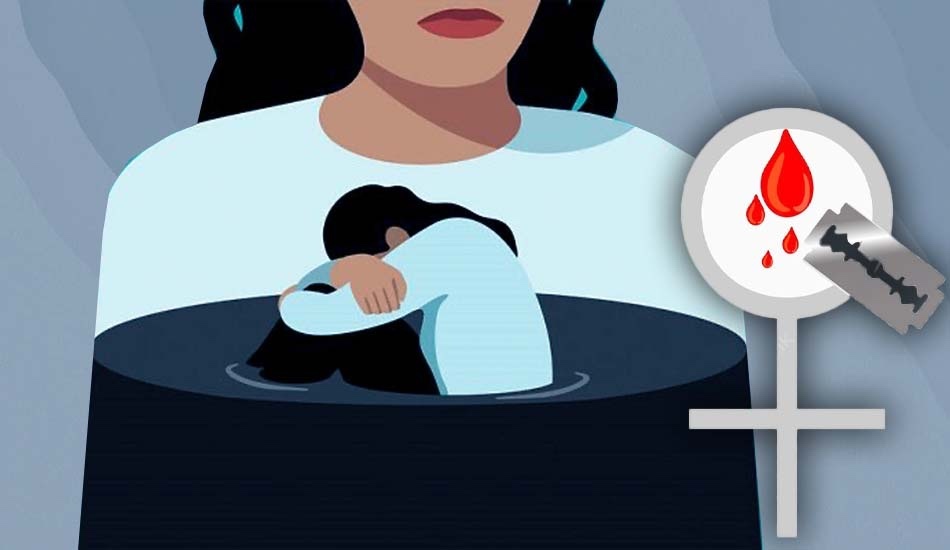India Refuses To Acknowledge Female Genital Mutilation, Let Alone Make Laws To Curb It
It's time our voices are heard!
As women, we’re all cursed to shoulder the responsibility of “ghar ki izzat” and “aabru” and whatnot. And according to society, the “ghar ki izzat” resides in our holy vaginas and this is exactly why we must protect the social construct of virginity by refraining from having pre-marital sex or experiencing any kind of sexual pleasure. While sexual pleasure for men is normalised and believed to be a bodily need, the same rule does not apply to women. Society uses different tools to suppress the sexuality of a woman from the moment she is born and one such tool is female genital mutilation.
But What Is Female Genital Mutilation?
Also known as FGM, female genital mutilation is the procedure of partially or totally removing the external female genitalia or clitoral hood for non-medical reasons. It also involves causing other injuries to the genitals. FGM is performed on girls when they’re at a young age ranging from 7 to 15 years. Essentially, the purpose of this practice is to remove a part of the skin for “purity and cleanliness”. It is also believed that this practice helps control the sexual urges in women and prevents them from indulging in pre-marital sex or infidelity. Several communities see this practice, which is deeply rooted in gender inequality, as a rite of passage as well as a tool to suppress a woman’s sexuality and ensure her chastity.
What Is The Impact Of FGM?
Female genital mutilation is a practice that continues to be a dark and dirty secret hidden behind a veil. It is usually practised illegally meaning that this procedure of partial or complete removal of female genitalia is conducted by someone who may have conducted it on several other girls but is not a medical practitioner. The result of this is rather horrifying. Short-term complications caused by FGM are excessive bleeding, swelling, severe pain, infection, shock, haemorrhage, urinary infection, gangrene, endometritis, the transmission of HIV, hepatitis B and C and even death. Apart from this, FGM can potentially lead to long-term and serious health-related complications even in adulthood like infertility, complications during pregnancy or childbirth, postpartum haemorrhage, stillbirth and several other issues.
But that’s not all, female genital mutilation also has psychological effects which happen to be long-term. The first thing to note is that this procedure is generally performed on girls at a very young age which not only is a violation of their bodies but also of their trust in their parents or guardians. It can also lead to post-traumatic stress disorder caused by the trauma of the procedure as well as anxiety and depression. Furthermore, this practice reduces the sensation in the female genitalia which in turn kills sexual desire. In some cases, it can also lead to severe pain during sexual intercourse.
Today is the International Day of Zero Tolerance for Female Genital Mutilation (FGM).
FGM is an extreme form of discrimination against women, violates #HumanRights, and causes serious health harms.
It must be prevented: #EndFGM!
👉 https://t.co/3patABwfva pic.twitter.com/4RFvTEW9XI
— World Health Organization (WHO) (@WHO) February 6, 2023
Also Read: 6 Ways Women’s Sexuality Is Systematically Curbed In Our Society
Does It Happen In India?
Also known as khatna, khafz or khafd, female genital mutilation is commonly practised by the Dawoodi Bohra community which is a sect of Shia Muslims in India.
200 million women & girls alive today have been subjected to female genital mutilation (FGM), which involves altering or injuring the female genitalia for non-medical reasons.
It's a human rights violation.
More from @UNFPA on Monday's #EndFGM Day. https://t.co/xicMqnk08A pic.twitter.com/OqTDK0KVEI
— United Nations (@UN) February 6, 2023
Are There Any Laws Against It?
Despite female genital mutilation being considered a human rights violation, India does not have any laws against it. And the reason is the lack of acknowledgement and data. India does not have any official data about female genital mutilation being practised. Even though several international organisations and researchers have studied the prevalence of this practice in India and even revealed data about FGM. And yet, India has effectively failed to acknowledge the existence of this practice or collect data, forget making laws to criminalise it.
She went through female genital mutilation, and today she has an important message.
You can do something to #EndFGM:
🧡You can share this message
🧡Lend your voice
🧡Donate to organizations that are working to end FGM🎞️Our Goodwill Ambassador @JahaENDFGM #GenerationEquality pic.twitter.com/Zotr7IKYf1
— UN Women (@UN_Women) February 6, 2023
India Continues To Hide Female Genital Mutilation In Dark And Dingy Streets
Over the past few years, several cases of brutality have come to light after women who were subjected to female genital mutilation came out to speak up against it. Many shared the horrifying stories of the trauma they experienced when their aunts, mothers or guardians tricked them into the procedure which left them screaming out in pain due to the cruel and inhumane practice.
Today is International Day of Zero Tolerance for Female Genital Mutilation.
It's a moment to lead change wherever we have influence, fund intervention, demand accountability and listen to the voices of girls & young women.
#EndFGM pic.twitter.com/KqV4u4Pviz
— UN Women (@UN_Women) February 6, 2023
Also Read: Costa Rica Urges India To Acknowledge The Existence Of Female Genital Mutilation And Criminalise It
Even though India has not officially acknowledged the prevalence of female genital mutilation in the country, in the past few years, there have been several conversations, debates and even online petitions seeking a ban on this practice. Mumbai-based NGOs Sahiyo and We Speak Out have launched campaigns against this practice and even conducted a survey in 2017 and shared the data on it, which is something that the Indian government should have done. The same year, the topic of FGM in India was brought up at the United Nations after a written submission about it was presented at the United Nations Human Rights Council.
In May 2017, a PIL was filed in the Supreme Court of India by a Delhi-based advocate seeking a ban on female genital mutilation in India. As per the petition, the practice was termed as a violation of Article 14 and Article 21 of the Indian constitution which guarantees the right to equality and the right to life. But when the Apex court sought replies from central government ministries as well as state government, it was revealed that the country lacks official data on this practice. The Women and Child Development Ministry told the Supreme Court that there is no official study or data to prove the existence of female genital mutilation in the country. In 2018, the case was adjourned by the Supreme Court bench after issuing notices to the states. The PIL was later referred to a five-judge bench and in 2019, it was again referred to a seven-judge bench.
Health workers need to know how to treat the health conditions that may affect women & girls living with female genital mutilation.
They can also play a crucial role as advocates to #EndFGM.
👉 https://t.co/eRqy0d2yX0 pic.twitter.com/xQJBuxfZpb
— World Health Organization (WHO) (@WHO) February 6, 2023
At the Annual Universal Periodic Review of Human Rights At the 41st UNHRC, Costa Rice spoke about female genital mutilation in India and asked our country to not just acknowledge it but also take essential steps to put an end to this practice by criminalising it.
In 2023, even after multiple women opened up and shared the horrifying stories of the pain suffered by them due to this “traditional practice” of female genital mutilation, nothing has changed. Multiple petitions, debates, discussions and even a petition in court have not helped women get any protection from this crime which continues to be committed against young girls who are robbed of sexual pleasure because of some skewed perspectives and ideas.
Catherine Meng’anyi is a survivor of female genital mutilation, a dedicated nurse and a passionate advocate to #EndFGM in her lifetime.
Learn how she managed to rescue hundreds of young girls from FGM and early marriage in #Kenya 🇰🇪:
📌 https://t.co/KgpRgA9HMm pic.twitter.com/GxXnKBWCz7— World Health Organization (WHO) (@WHO) February 6, 2023
Also Read: Do Men And Women Experience Sexuality Differently? Studies Reveal Interesting Facts
For years, women have been screaming at the top of their lungs with hopes that someone will hear them scream in agony but neither the Court nor the Indian government has heard them. February 6 is observed as the International Day of Zero Tolerance For Female Genital Mutilation and the UN has called for the elimination of this practice globally before 2030. In 2023, we’re just 7 years away from this goal but India falls behind on the global front because as a whole, our country has failed to accept and acknowledge that women are subjected to this inhumane practice in India. Years of battle and screaming, our voices still haven’t been heard. Forget being heard, the Indian government still hasn’t bothered to study and research the prevalence of this practice even after women across the country have come out to speak out against this practice. India continues to turn a blind eye to the pain of female citizens despite the noise we are making.
Women & girls living with female genital mutilation can face serious & lifelong threats to their health & well-being, including:
♦️ psychological trauma
♦️ sexual problems
♦️ recurrent infections
♦️ complications during childbirth
♦️ other chronic health issuesLet's #EndFGM pic.twitter.com/FKXCBWC6GR
— World Health Organization (WHO) (@WHO) February 6, 2023
But when and where does this end? Will women ever have enough laws to feel safe and protected by the Indian justice system? Or will we have to continue suffering due to the age-old traditions and customs designed to suppress and oppress women? It is time this government heard our voice and get its act together.
In Kenya, Someone Put A Petition Against The Female Genital Mutilation Ban. The Judge Dismissed It


















